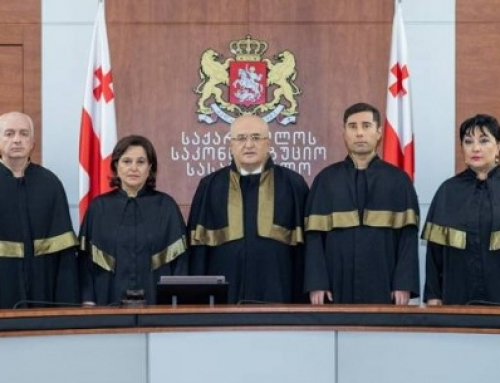
Journalist Gela Mtivlishvili was detained in Tianeti on May 20 for trying to film a police station. A doctor confirmed that he had been beaten. The interior ministry denies that any violence took place. (Photo: Interpressnews.)
TBILISI, DFWatch – Journalists in Georgia demand to meet with President Mikheil Saakashvili and ask him about a series of cases of harassment and violation of their rights.
The appeal is backed by 24 media units.
On May 25, journalists are planning to hold a protest in front of the Ministry of Justice to demand immediate investigations of recent incidents of harassment of journalists. They are also asking that officials who interfered in the work of journalists are punished.
As reported by DF Watch, verbal and physical abuse is still common, and there have been cases of illegal detention.
“20 cases of harassment on journalists happened in latest two months. The government refuses to investigate these incidents. No offending official has been punished,” the statement says, and calls for of journalist colleagues to join the protest on May 25.
The media advocacy group Solidarity for Freedom of Media sent a separate appeal to Saakashvili, pointing out that when he came to power after the rose revolution in 2003, he promised to meet with independent journalists regularly, but only has done it twice in all those years.
“This meeting clearly showed that transparency of the government’s activity and that journalists’ freedom of speech was only imaginary. Afterwards, you almost stopped open meetings with journalists,’ the letter says, ‘you painfully react on direct acute questions, like you left the session hall after a speech by an opposition MP in the parliament.”
May 21, the Georgian Public Defender asked the Prosecutor’s Office to study cases of harassment of journalists. One of the cases named in the ombudsman’s appeal refers to May 11, when investigative journalists were interrupted by local police in Dusheti, northern Georgia.
Journalists wanted to speak with the governor of that region. One of them tried to take a video of the administrative building, but the police became aggressive, restricted video filming, attacked the journalist and threatened to beat him.
Another violent episode recently was when Gela Mtivlishvili, head of information center of Kakheti, was detained in Tianeti region on May 20, after which he asked the prosecutor to investigate the case.
The journalist was trying to film the police building in Tianeti, when a person dressed in civilian clothes approached him. The man refused to identify himself, but later appeared to be policeman. They took away his camera. Mtivlishvili says he was beaten and not given an opportunity to call a lawyer.
He felt bad and was transferred to a local hospital. Later the police returned the camera, but the video and images had been erased.
Representatives of Georgian Young Lawyer’s Association (GYLA) spoke with the doctor that treated Mtivlishvili, who said that the patient had been beaten and was suffering from head pain, but there were no surface injuries.
“The state has an obligation to fully ensure physical and psychological integrity of an individual when s/he is under the control of authorities. We believe that in this incident, the burden of proof rests with the state and more specifically, with the Ministry of Interior Affairs of Georgia, in order to dispel the public’s suspicions about violation of integrity of the individual concerned. We believe that a probe must be launched into the incident with a particular focus on signs of interference with the professional activities and beating of a journalist,” GYLA representatives say.
The Interior Ministry gives another account of the incident and claims no violation took place. According to a statement, the journalist was taking pictures of the police building, when police asked him to identify himself. Mtivlishvili refused. He was taken inside the building and was released immediately after identifying himself.
The ministry writes that he refused to leave the building, so the police forced him to leave, although the statements claims that there was no violence.
“There was no physical confrontation during the incident.”
The Interior Ministry claims that journalists are in their full right to take pictures of police buildings, but the ministry calls for more correctness.





Leave A Comment
You must be logged in to post a comment.